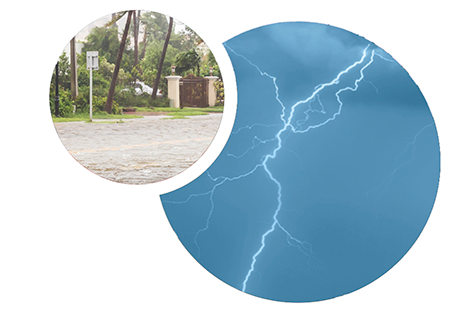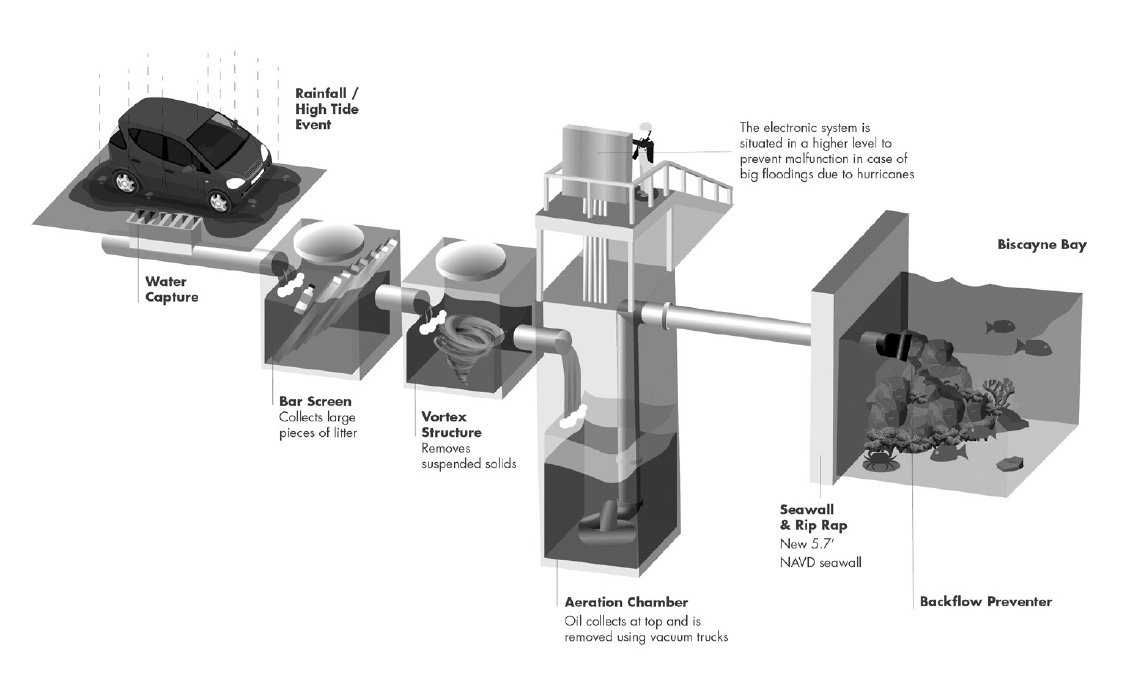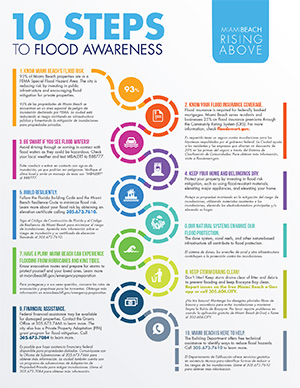
Why Extreme Rain Events Cause Flooding
Miami Beach is a beautiful coastal community. Our sunkissed island is surrounded by the waters of the Atlantic Ocean and Biscayne Bay. Miami Beach is leading the way locally and nationally to reduce flood risk, however we want you to be aware and protect yourself and your property. These efforts are also intended to reduce risk from sea level rise.
Miami Beach is a beautiful coastal community. Our sunkissed island is surrounded by the waters of the Atlantic Ocean and Biscayne Bay. Miami Beach is leading the way locally and nationally to reduce flood risk, however we want you to be aware and protect yourself and your property. These efforts are also intended to reduce risk from sea level rise.
Flooding can range from being unexpected, like a fast and heavy rainfall, to being known and communicated in advance, such as in the case of King Tides and hurricanes.
Weather can be unpredictable. Thinking ahead can keep you safe and reduce damage to your car and home. Think about having sand bags ready, putting up flood panels, adjusting your work schedule if possible, parking your car in a higher location, and wearing rain boots if you must be out in the elements. Most of all, many times it is best to stay put and give the stormwater system time to drain the water.
At the start of hurricane season, June 1, develop a plan for these more significant events. Click here to view our Hurricane Guide.
Why Does Miami Beach Have Flooding Challenges?
It is difficult to drain a city
that is an island, flat, and only a few feet above sea level in many places. Since we are flat, we lack the energy for drainage created by gravity, and water drains slowly.
Miami Beach’s hydrology makes draining rainwater difficult.
We have a high groundwater that reduces the ground’s ability to absorb rainwater. In addition, the subsurface is porous limestone, and is affected by the surrounding Bay and Ocean water.
Many of our outfalls are tidally influenced.
An outfall is the location where the stormwater exits the system to a water body. This means the higher the tide, the more slowly stormwater can drain.
Miami Beach is densely populated.
At only 7 square miles, we lack large open spaces, such as wetlands, to drain rainwater. Impervious surfaces, hard surfaces like concrete, do not allow rain to soak in. These surfaces contribute to the amount of runoff and how fast the runoff travels to the collection system.
If all rain was slow and gentle
we would be less at risk for flooding. However, all rain storms are different.
How Does Rainwater Drain? What About Pumps?
1. Rain falls to the ground and runs off impervious surfaces. Stormwater flows across the land, over parking lots, through swales, down ditches, along gutters, and eventually makes its way to storm grates.
2. Stormwater flows into storm grates and is collected in the basin.
3. Stormwater flows from catch basin into the system of stormwater pipes.
4. Stormwater flows through conveyance system to the outfall. Miami Beach is now moving to a system of pumps to more quickly and effectively drain the water to the outfalls.
Each of these four steps requires an amount of time to accomplish, so no matter how a system is designed, draining an area of land can never be instantaneous. Each of these four steps offers an opportunity for a bottleneck to develop and slow down the whole process. If the rain falls at a faster rate than any one of the steps can accommodate, the system will back up and ponding (standing water) will occur.
For practicality and cost-effectiveness, new stormwater collection systems are designed to accommodate the runoff from a rain event of a certain intensity and duration, called the design storm. Any rain event larger than the design storm will cause the system to back up. The flatter the land, the slower the water will move, and the more time it will take to drain an area of land.
We are all in this together. Miami Beach has installed new stormwater systems and has elevated roads in many vulnerable areas in the city. To learn more, visit www.mbrisingabove.com.


 83°
83° 

